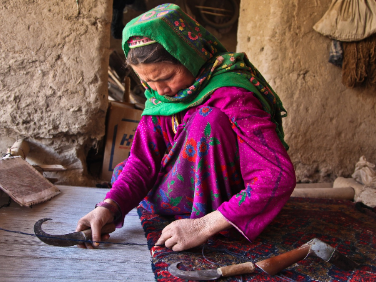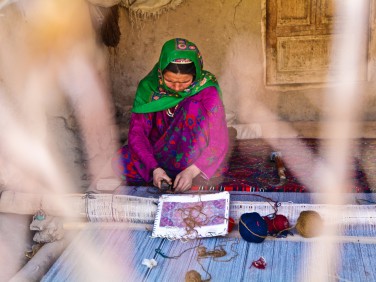
Meet Habiba, weaving her way out of poverty
Hand in Hand business trainees learn all kinds of skills – customer care, market research, product diversification – but carpet weaver Habiba, who joined a Self-Help Group last year, credits two in particular with lifting her out of extreme poverty: saving and carpet design. Given her six-fold increase in monthly income, it’s easy to see why.
Finding the thread
Until recently, Habiba wove carpets on wages for local shops. In Afghanistan’s far north, near the Uzbek border, weaving is tradition – an industry built of necessity in a region with poor soil and even worse water management.
 Trade with Central Asia has historically buoyed business, but recent unrest in the region means times have been hard – so hard, in fact, that Habiba’s children faced having to find work. Making matters worse, an influx of Uzbek insurgents paired with the region’s difficult roads meant help from NGOs was increasingly scarce. So when Hand in Hand arrived in her village offering business training, Habiba jumped at the opportunity.
Trade with Central Asia has historically buoyed business, but recent unrest in the region means times have been hard – so hard, in fact, that Habiba’s children faced having to find work. Making matters worse, an influx of Uzbek insurgents paired with the region’s difficult roads meant help from NGOs was increasingly scarce. So when Hand in Hand arrived in her village offering business training, Habiba jumped at the opportunity.
“I didn’t know about saving before, so I wasn’t able to start my own business,” says the 30-year-old mother of four. “I also didn’t have the skills to design new carpets. But I learned how to do both in my (Self-Help) Group.”
“The people I work with face many problems – poverty, a lack of education, inadequate life skills – but by the time they graduate I find them strong and enabled. When they start to earn money they improve their position in the family and in society”
-Hand in Hand trainer Palwasha Rafiqzada
A micro-entrepreneur’s guide to growth
That’s not all she learned. Recognising the threat posed by imported, chemically treated, machine-made carpets, Habiba devised a plan.

First, she researched which sizes and designs were most popular in local marketplaces. Next, she made sure to advertise her carpets’ competitive qualities: designs made to order, traditional craftsmanship and natural materials. Finally, she sought out new markets, engaging shop owners in Mazar-i-Sharif, the closest major city, and traders to export her carpets to neighbouring Uzbekistan. The result: an increase in monthly income from 2,500AFN (US $45) to 16,600AFN (US $300).
“There is no public school in our village but now I can afford to pay the fees for a nearby private school. I can also afford better food and clothes,” says Habiba.
Habiba’s results
![]()
Six-fold increase in monthly income
![]()
Expanded into foreign markets
![]()
Able to cover school fees for her children
Next case study: Business heats up for chilli farmer Marie Consolee
